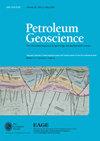CO2 mineral trapping comparison in different regions: predicted geochemical reactivity of the Precipice Sandstone reservoir and overlying Evergreen Formation
IF 2.1
4区 地球科学
Q3 GEOSCIENCES, MULTIDISCIPLINARY
引用次数: 12
Abstract
Injected CO2 streams may have geochemical reactivity to different rock types in a CO2 storage complex depending on solubility and formation water chemistry. The Precipice Sandstone and Evergreen Formation are a low-salinity reservoir–seal pair in the Surat Basin, Australia, targeted for potential CO2 storage. The kinetic geochemical CO2 reactivity of different rock facies from three regions were predicted over 30 and 1000 year time periods. No material CO2 mineral trapping in the quartz-rich Precipice Sandstone reservoir was predicted, owing to the low rock reactivity. Predicted CO2 mineral trapping in the Evergreen Formation was more variable due to different amounts of more reactive feldspars, clays, calcite and siderite. Predicted mineral trapping as siderite and ankerite was between 0.03 and 8.4 kg m−3 CO2, and mainly depends on chlorite and plagioclase content. Predicted pH was between 5 and 7.5 after 1000 years. Pyrite precipitation was also predicted with SO2 present in the injectate. QEMSCAN and SEM-EDS (scanning electron microscopy and energy-dispersive spectroscopy) spot imaging of samples from the seal containing natural fractures filled by siderite, pyrite, clays, ankerite, calcite, barite and apatite represent a natural analogue for natural mineral trapping. These are in good agreement with our model predictions. This study suggests that, from a geochemical perspective, the Precipice Sandstone is a suitable storage reservoir, whereas mineral trapping would occur in the overlying Evergreen Formation. Supplementary material: Additional model inputs, characterization and model images, and an excel file of QEMSCAN mineral and porosity components, are available at https://doi.org/10.6084/m9.figshare.c.5395393 Thematic collection: This article is part of the Geoscience for CO2 storage collection available at: https://www.lyellcollection.org/cc/geoscience-for-co2-storage不同地区CO2矿物捕集比较:预测沉积砂岩储层和上覆长荣组的地球化学反应
注入的CO2流可能对CO2储存复合体中的不同岩石类型具有地球化学反应性,这取决于溶解度和地层水化学性质。沉淀砂岩和长荣组是澳大利亚苏拉特盆地的一对低盐度储层-封存层,旨在储存潜在的二氧化碳。预测了三个地区不同岩相的动力学地球化学CO2反应性,预测值分别为30和1000 年时间段。由于岩石反应性低,预测富含石英的沉淀砂岩储层中没有物质CO2矿物捕获。由于不同数量的反应性更强的长石、粘土、方解石和菱铁矿,预测的长荣组CO2矿物捕获变化更大。作为菱铁矿和铁白云石的预测矿物捕获在0.03到8.4之间 公斤 m−3 CO2,主要取决于绿泥石和斜长石的含量。1000后预测pH值在5和7.5之间 年。在注入物中存在SO2的情况下,还预测了黄铁矿沉淀。QEMSCAN和SEM-EDS(扫描电子显微镜和能量色散光谱)对来自由菱铁矿、黄铁矿、粘土、铁白云石、方解石、重晶石和磷灰石填充的含有天然裂缝的密封层的样品进行斑点成像,代表了天然矿物捕集的天然类似物。这些与我们的模型预测非常一致。这项研究表明,从地球化学角度来看,沉淀砂岩是一个合适的储层,而矿物捕获将发生在上覆的常青组中。补充材料:其他模型输入、表征和模型图像,以及QEMSCAN矿物和孔隙度成分的excel文件,可在https://doi.org/10.6084/m9.figshare.c.5395393专题收藏:本文是二氧化碳储存地球科学收藏的一部分,可在:https://www.lyellcollection.org/cc/geoscience-for-co2-storage
本文章由计算机程序翻译,如有差异,请以英文原文为准。
求助全文
约1分钟内获得全文
求助全文
来源期刊

Petroleum Geoscience
地学-地球科学综合
CiteScore
4.80
自引率
11.80%
发文量
28
审稿时长
>12 weeks
期刊介绍:
Petroleum Geoscience is the international journal of geoenergy and applied earth science, and is co-owned by the Geological Society of London and the European Association of Geoscientists and Engineers (EAGE).
Petroleum Geoscience transcends disciplinary boundaries and publishes a balanced mix of articles covering exploration, exploitation, appraisal, development and enhancement of sub-surface hydrocarbon resources and carbon repositories. The integration of disciplines in an applied context, whether for fluid production, carbon storage or related geoenergy applications, is a particular strength of the journal. Articles on enhancing exploration efficiency, lowering technological and environmental risk, and improving hydrocarbon recovery communicate the latest developments in sub-surface geoscience to a wide readership.
Petroleum Geoscience provides a multidisciplinary forum for those engaged in the science and technology of the rock-related sub-surface disciplines. The journal reaches some 8000 individual subscribers, and a further 1100 institutional subscriptions provide global access to readers including geologists, geophysicists, petroleum and reservoir engineers, petrophysicists and geochemists in both academia and industry. The journal aims to share knowledge of reservoir geoscience and to reflect the international nature of its development.
 求助内容:
求助内容: 应助结果提醒方式:
应助结果提醒方式:


